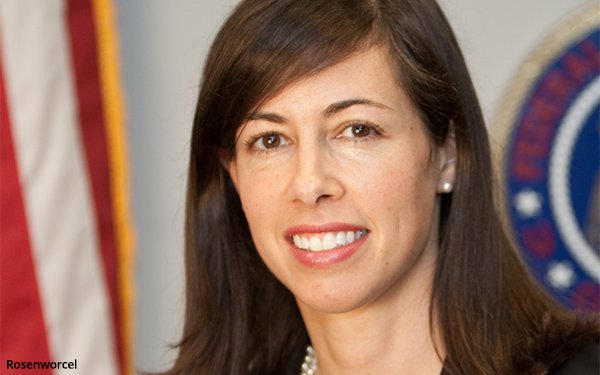FCC Chair Proposes Restoring Open Internet Rules
- by Wendy Davis @wendyndavis, September 26, 2023

Federal Communications Commission chair Jessica Rosenworcel said Tuesday she is moving forward with a proposal for sweeping broadband regulations that would restore the Obama-era open internet rules -- including bans on blocking or throttling content, and on charging higher fees for prioritized delivery.
"Communications means a lot more than just phone calls. It means access to the internet because broadband is the most important infrastructure of our time," she said in a speech at the National Press Club in Washington, D.C.
Internet access "should be more than just accessible and affordable," she said, adding: "The internet also needs to be open."
advertisement
advertisement
The potential rules will include a key provision reclassifying broadband as a utility service, regulated under Title II of the Communications Act. That reclassification is necessary to restore the FCC's authority to regulate broadband carriers.
“Common sense tells us that the nation's leading communications watchdog should have the muscle it needs to protect consumers and make sure their internet access is fast, open and fair," she said.
She added that reclassification will pave the way for the FCC to extend some telephone privacy regulations to broadband.
“The law requires telecommunications providers to protect the confidentiality of the proprietary information of their customers. That means these providers cannot sell your location data, among other sensitive information,” she said.
“These privacy protections currently extend to phone service customers, but not to broadband subscribers... Does that really make sense? Do we want our broadband providers selling off what we do and where we go online?”
Rosenworcel's current push for federal broadband rules comes one day after telecom attorney Anna Gomez was sworn in as the FCC's fifth commissioner, giving the agency a Democratic majority for the first time in more than two years.
On Monday, a coalition of senators urged Rosenworcel to “expeditiously” reclassify broadband as a utility.
“Only with Title II classification can the FCC prohibit unreasonable and unjust practices of broadband providers, effectively protect network resiliency and national security, ensure service quality, expand internet access, and combat anti-competitive practices,” Senators Ed Markey (D-Massachusetts), Ron Wyden (D-Oregon) and 25 others said in a letter to the FCC head.
The industry group USTelecom--The Broadband Association, which opposes net neutrality regulations, criticized the proposed rules.
“Treating broadband as a Title II utility is a dangerous and costly solution in search of a problem,” Jonathan Spalter, president & CEO of the group, stated.
But consumer advocates cheered Rosenworcel's move.
"We need an FCC that clearly accepts and asserts its authority to protect consumers in the broadband market,” Chris Lewis, president and CEO at Public Knowledge, said Tuesday.
“Without Title II authority, the FCC is left in a position where it must beg for pledges and promises from broadband providers to participate in closing the digital divide.”
The FCC previously attempted to issue net neutrality protections, but those efforts were either shot down in court, or repealed with a change in administration.
For instance, the FCC said in a 2005 policy statement that broadband subscribers should have the ability to access all lawful content, applications and services. But that statement was later held unenforceable in court.
More recently, the FCC voted 3-2 in 2015 to categorize broadband as a Title II service and impose some common carrier rules, including bans on blocking or throttling traffic. The following year, the agency came under Republican control and repealed the 2015 order. Former chairman Ajit Pai said at the time that the prior rules were too heavy-handed.
Since then, several states enacted their own regulations.
In California, for example, a 2018 law prohibits broadband providers from blocking or throttling traffic, charging higher fees for fast-lane service, and exempting their own video streams from consumers' data caps.
That law was upheld last year by the 9th Circuit Court of Appeals.
Rosenworcel will publicly release a detailed proposal on Thursday, and the FCC will vote in October on whether to move forward. If so, the agency will then seek comments from the public.


